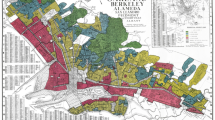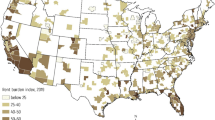Abstract
Previous research has found that moving has lasting effects on housing satisfaction while adaptation to changing living environments is surprisingly absent from this research. This paper challenges and extends this current state of research. Using data from a large-scale German household panel we find that housing satisfaction (a) sharply declines before the move (self-selection into relocation), (b) substantially increases after moving (relocation effect), (c) declines in the following years (adaptation), (d) after about 2 years reaches satisfaction levels similar to the levels several years before the move (full adaptation), (e) but due to selection into moving stays above satisfaction levels in the years directly before the move (lasting gains due to self-selection). Further analyses indicate that moving due to house-related reasons leads to partly lasting gains, while moving due to significant life events only has temporary effects. Finally, we show that permanent changes in housing satisfaction due to house-related relocations can be fully explained using self-assessed comparisons between old and new living environment.




Similar content being viewed by others
Notes
Stevenson and Wolfers (2008) question the existence of the Easterlin paradox on empirical grounds. They find comparable income effects within and between countries and also of income changes over time. Thus, as Alan Krueger (2008) suggests in his comment on their article, one could more precisely speak of the Easterlin hypothesis or conjecture.
References
Allison, P. D. (1994). Using panel data to estimate the effects of events. Sociological Methods and Research, 23, 174–199.
Andreß, H. J., Golsch, K., & Schmidt, A. W. (2013). Applied Panel Data Analysis for Economic and Social Surveys. Berlin: Springer.
Brickman, P., & Campbell, D. T. (1971). Hedonic relativism and planning the good society. In M. H. Appley (Ed.), Adaption-Level Theory: A Symposium (pp. 287–302). New York: Academic Press.
Brüderl, J., & Ludwig, V. (2015). Fixed-effects panel regression. In H. Best & C. Wolf (Eds.), Regression Analysis and Causal Inference (pp. 327–336). Los Angeles: Sage.
Campbell, A., Converse, P., & Rodgers, W. (1976). The Quality of American Life: Perceptions, Evaluations and Satisfaction. New York: Russell Sage.
Clark, A. E. (1999). Are wages habit-forming? Evidence from micro data. Journal of Economic Behavior & Organization, 39, 179–200.
Clark, A. E., Frijters, P., & Shields, M. A. (2008). Relative income, happiness, and utility. An explanation for the Easterlin paradox and other puzzles. Journal of Economic Literature, 46, 95–144.
Clark, A. E., & Senik, C. (2010). Who compares to whom? The anatomy of income comparisons in Europe. The Economic Journal, 120, 573–594.
De Neve, J. E., Christakis, N. A., Fowler, J. H., & Frey, B. S. (2012). Genes, economics, and happiness. Journal of Neuroscience, Psychology, and Economics, 5, 193–211.
Destatis. (2013). Datenreport 2013 Ein Sozialbericht für die Bundesrepublik Deutschland. Bonn: Bundeszentrale für politische Bildung.
Di Tella, R., Haisken-DeNew, J., & MacCulloch, R. (2010). Happiness adaptation to income and to status in an individual panel. Journal of Economic Behavior and Organization, 76, 834–852.
Diaz-Serrano, L. (2009). Disentangling the housing satisfaction puzzle: Does homeownership really matter? Journal of Economic Psychology, 30, 745–755.
Diaz-Serrano, L., & Stoyanova, A. P. (2010). Mobility and housing satisfaction: An empirical analysis for twelve EU countries. Journal of Economic Geography, 10, 661–683.
Diener, E. (1984). Subjective well-being. Psychological Bulletin, 95, 542–575.
Diener, E., Lucas, R. E., & Scollon, C. N. (2006). Beyond the hedonic treadmill. American Psychologist, 61, 305–314.
Dufty-Jones, R. (2012). Moving home: Conceptual and policy implications of the housing-mobility nexus. AHURI final report no. 189. Melbourne: Australian Housing and Urban Research Institute.
Easterlin, R. A. (1974). Does economic growth improve the human lot? In P. A. David & M. W. Reder (Eds.), Nations and households in economic growth: Essays in honor of Moses Abramovitz (pp. 89–125). New York: Academic Press.
Easterlin, R. A. (2001). Income and happiness: Towards a unified theory. The Economic Journal, 111, 465–484.
Easterlin, R. A., McVey, L. A., Switek, M., Sawangfa, O., & Zweig, J. S. (2010). The happiness-income-paradox revisited. Proceedings of the National Academy of Sciences of the United States of America, 107, 22463–22469.
Elsinga, M., & Hoekstra, J. (2005). Homeownership and housing satisfaction. Journal of Housing and The Built Environment, 20, 401–424.
Elster, J., & Roemer, J. E. (Eds.). (1991). Interpersonal comparisons of well-being. Cambridge: Cambridge University Press.
Fechner, G. T. (1860). Elemente der Psychophysik (Vol. 2). Leipzig: Breitkopf und Härtel.
Firebaugh, G., & Schroeder, M. B. (2009). Does your neighbor’s income affect your happiness? American Journal of Sociology, 115, 805–831.
Frank, R. H. (1985). Choosing the right pond. human behavior and the quest for status. New York/Oxford: Oxford University Press.
Headey, B., Muffels, R. J. A., & Wagner, G. (2014). National panel studies show substantial minorities recording long term change in life satisfaction: Implications for set-point theory. In K. Sheldon & R. E. Lucas (Eds.), Stability of Happiness. Theories and Evidence on Whether Happiness Can Change (pp. 99–128). New York: Academic Press.
Hu, F. (2013). Homeownership and subjective wellbeing in urban China: Does owning a house make you happier? Social Indicators Research, 110, 951–971.
Krueger, A. (2008). Comment. Brookings Paper on Economic Activity, 95–100.
Lucas, R. E. (2007). Adaptation and the set-point model of subjective well-being: Does happiness change after major life events? Current Directions in Psychological Science, 16, 75–80.
Luhmann, M., Hofmann, W., Eid, M., & Lucas, R. E. (2012). Subjective well-being and adaptation to life events: A meta-analysis. Journal of Personality and Social Psychology, 102, 592–615.
Luttmer, E. F. P. (2005). Neighbors as negatives: Relative earnings and well-being. Quarterly Journal of Economics, 120, 963–1001.
Lykken, D., & Tellegen, A. (1996). Happiness is a stochastic phenomenon. Psychological Science, 7, 186–189.
Marans, R. W., & Stimson, R. (2011). An overview of quality of urban life. In R. W. Marans & R. Stimson (Eds.), Urban quality of life: Implications for policy, planning and research (pp. 1–29). Dordrecht: Springer.
McCrea, R. (2007). Urban quality of life: Linking objective dimensions and subjective evaluations of the urban environment. Unpublished PhD thesis, The University of Queensland, Brisbane.
McCrea, R. (2014). Modelling effects of intervening variables using path analysis. In R. J. Stimson (Ed.), Handbook for spatially integrated social science research methodology (pp. 489–510). Cheltenham: Edward Elgar Publishing.
McCrea, R., Shyy, T.-K., & Stimson, R. (2006). What is the strength of the link between objective and subjective indicators of urban quality of life? Applied Research in Quality of Life, 1(1), 79–96.
McCrea, R., Western, J., & Stimson, R. (2011). Modelling determinants of subjective quality of urban life at different geographic scales: The case of the Brisbane-SEQ region. In R. W. Marans & R. Stimson (Eds.), Urban quality of life: Implications for policy, planning and research (pp. 347–367). Dordrecht: Springer.
Merton, R. K. (1968). Social theory and social structure. New York: The Free Press.
Michalos, A. C., & Zumbo, B. D. (1999). Public services and the quality of life. Social Indicators Research, 48, 125–156.
Nakazato, N. (2014). Living conditions and well-being using German Socio-Economic Panel. In A. C. Michalos (Ed.), Encyclopedia of quality of life and well-being research (pp. 3647–3653). Dordrecht: Springer.
Nakazato, N., Schimmack, U., & Oishi, S. (2011). Effect of changes in living conditions on well-being: A prospective top-down bottom-up model. Social Indicators Research, 100, 115–135.
Rossi, P. (1980). Why families move. Newbury Park, CA: Sage.
Selten, R. (1998). Aspiration adaptation theory. Journal of Mathematical Psychology, 42, 191–214.
Simon, H. A. (1956). Rational choice and the structure of the environment. Psychological Review, 63, 129–138.
Stevenson, B., & Wolfers, J. (2008). Economic growth and subjective well-being: Reassessing the Easterlin paradox. Brookings Paper on Economic Activity, 1–87.
Stutzer, A. (2004). The role of income aspirations in individual happiness. Journal of Economic Behavior and Organization, 54, 89–109.
Tomaszewski, W., & Perales, F. (2014). Who settles for less? Subjective dispositions, objective circumstances, and housing satisfaction. Social Indicators Research, 118, 181–203.
Vera-Toscano, E., & Ateca-Amestoy, V. (2008). The relevance of social interactions on housing satisfaction. Social Indicators Research, 86, 257–274.
von Wirth, T., Grêt-Regamey, A., & Stauffacher, M. (2015). Mediating effects between objective and subjective indicators of urban quality of life: Testing specific models for safety and access. Social Indicators Research, 122(1), 189–210.
Wagner, G. G., Frick, J. R., & Schupp, J. (2007). The German socio-economic panel study (SOEP)—scope, evolution and enhancements. Schmollers Jahrbuch–Journal of Applied Social Science Studies, 127, 139–169.
Weber, E. H. (1834). De Pulsu, Resorptione Auditu Et Tactu. Annotationes Anatomicae Et Physiologicae. Leipzig: Koehler.
Wolbring, T., Keuschnigg, M., & Negele, E. (2013). Needs, comparisons, and adaptation: The importance of relative income for life satisfaction. European Sociological Review, 29, 86–104.
Acknowledgments
I thank Nate Breznau, Josef Brüderl, Jan Delhey, Andreas Haupt, Merlin Schaeffer, Ulrich Schimmack, Felix Wolter, and three anonymous reviewers for helpful comments. The dataset of the German Socio-economic Panel used for this publication has been provided by the DIW Berlin.
Author information
Authors and Affiliations
Corresponding author
Rights and permissions
About this article
Cite this article
Wolbring, T. Home Sweet Home! Does Moving Have (Lasting) Effects on Housing Satisfaction?. J Happiness Stud 18, 1359–1375 (2017). https://doi.org/10.1007/s10902-016-9774-5
Published:
Issue Date:
DOI: https://doi.org/10.1007/s10902-016-9774-5




